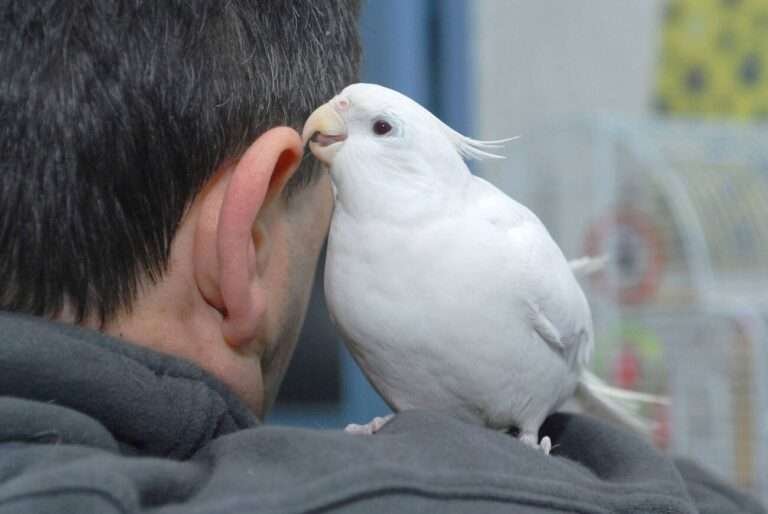How to Choose the Best Cockatiel for You

Introduction
Bringing a cockatiel into your home is a delightful and rewarding experience. These birds are not only friendly and calm but can also form strong bonds with their owners, making them one of the most popular pet birds worldwide. If you’re new to cockatiels or thinking about getting one, it’s important to know how to choose the right bird. A healthy, happy, and compatible cockatiel will make your experience as a bird owner much more enjoyable.
In this guide, we’ll walk you through everything you need to consider when choosing a cockatiel. Whether you’re a beginner or have experience with birds, these tips will help ensure you find the perfect feathered friend for your home.
1. Why a Cockatiel?
Before diving into the specifics of choosing a cockatiel, it’s worth exploring why cockatiels make such excellent pets. Cockatiels are native to Australia and are known for their friendly, social, and gentle nature. They are relatively easy to care for compared to other pet birds, which makes them a great choice for beginners.
Here are some reasons why cockatiels are wonderful companions:
- Affectionate and Social: Cockatiels love human interaction and can develop strong bonds with their owners.
- Trainable: With a bit of patience, cockatiels can learn tricks and even whistle or mimic sounds.
- Long Lifespan: Cockatiels typically live for 15-20 years, so they are long-term companions.
- Calm Nature: Unlike some more aggressive birds, cockatiels are usually calm and non-aggressive, even when housed with other birds.
Now that you know why cockatiels are such great pets, let’s move on to choosing the right one for you.
2. Male or Female? Choosing the Right Gender
One of the first decisions to make when choosing a cockatiel is whether to get a male or female bird. Both male and female cockatiels can make fantastic pets, but there are some differences in behavior and temperament that might influence your decision.
A. Male Cockatiels
Male cockatiels are generally more vocal than females. They love to whistle, chirp, and mimic sounds from their environment. If you’re looking for a more interactive bird, a male cockatiel might be the right choice. Male cockatiels are also known for their playful behavior and can be quite the entertainers.
Pros of Male Cockatiels:
- More likely to whistle and mimic sounds.
- Can be playful and energetic.
- Often more outgoing.
Cons of Male Cockatiels:
- Their vocalizations might be a bit too loud or frequent for some people.
- During the breeding season, they may become more territorial.
B. Female Cockatiels
Female cockatiels, on the other hand, are typically quieter and more laid-back than males. They can be more reserved but often form strong bonds with their owners. Female cockatiels are generally less likely to mimic sounds or whistle, but they can still be affectionate and interactive.
Pros of Female Cockatiels:
- Quieter and more calm.
- Less likely to become territorial during breeding season.
- Great for people looking for a quieter companion.
Cons of Female Cockatiels:
- Less likely to whistle or mimic sounds.
- They may lay eggs even without a mate, which can require special care.
Ultimately, the decision between a male or female cockatiel depends on your preferences. If you want a more vocal bird that enjoys interacting, a male might be the best choice. If you prefer a quieter, more reserved companion, a female could be ideal.
3. Age: Young Bird or an Older Cockatiel?
Another important factor to consider is the age of the cockatiel. Do you want to raise a young bird, or would you prefer an older, more experienced cockatiel? Both options come with their own set of benefits and challenges.
A. Choosing a Young Cockatiel
A young cockatiel, often referred to as a chick or juvenile, can be a joy to raise. Young birds are more adaptable and can be trained easily to get used to human interaction. Raising a young cockatiel allows you to shape its personality and build a strong bond from an early age.
Pros of a Young Cockatiel:
- Easier to train and socialize.
- More adaptable to new environments.
- Bonding with a young bird can be a very rewarding experience.
Cons of a Young Cockatiel:
- Requires more time, patience, and attention.
- Young birds can be fragile and need extra care.
B. Choosing an Older Cockatiel
Older cockatiels are often already accustomed to human interaction and might come with some basic training. These birds can make excellent companions for first-time bird owners or those who want a more settled bird. However, older cockatiels may also come with established behaviors that could take time to adjust.
Pros of an Older Cockatiel:
- Already trained or socialized.
- Easier to care for than a young bird.
- Can be less demanding in terms of time and attention.
Cons of an Older Cockatiel:
- May come with established habits that are hard to change.
- Bonding may take more time if the bird has had previous owners.
4. Health: What to Look for in a Healthy Cockatiel
Choosing a healthy cockatiel is crucial for ensuring a long and happy life for your new pet. When selecting a bird, there are several signs of good health you should look out for.
A. Bright Eyes
A healthy cockatiel should have bright, clear eyes without any discharge or cloudiness. Cloudy eyes or discharge could indicate an infection or illness.
B. Smooth, Glossy Feathers
The bird’s feathers should be smooth, glossy, and well-groomed. Avoid birds with fluffed, discolored, or missing feathers, as this could indicate stress or health problems.
C. Active and Alert Behavior
A healthy cockatiel should be active and alert. Watch how the bird interacts with its environment—does it seem curious and engaged, or does it appear lethargic and uninterested? Lethargy could be a sign of illness.
D. Clear Nostrils and Beak
Check the bird’s nostrils for any discharge, and make sure the beak is clean and free of cracks or overgrowth.
E. Clean Vent Area
The vent area (around the bird’s tail) should be clean and free of any buildup or staining. A dirty vent could indicate digestive problems or other health issues.
By ensuring that the bird you choose is in good health, you’ll save yourself from potential heartache and costly veterinary bills in the future.
5. Personality and Temperament: Finding a Cockatiel That Fits Your Lifestyle
Cockatiels, like people, have unique personalities. Some birds are outgoing and love interaction, while others are more reserved. Before making your final decision, spend time observing the bird’s personality to see if it matches your lifestyle and preferences.
A. Outgoing Birds
Some cockatiels are naturally more social and love attention. They enjoy being around people and might be more inclined to interact with you. These birds can be great for families or individuals who want an affectionate, playful pet.
B. Reserved Birds
On the other hand, some cockatiels are quieter and more independent. While they may still bond with their owners, they may not demand as much attention. If you have a busy schedule or prefer a pet that doesn’t require constant interaction, a more reserved cockatiel could be the right fit.
It’s important to spend time interacting with the bird before bringing it home. Watch how it responds to you and others—does it seem friendly and curious, or shy and nervous? Choose a bird whose personality fits well with your expectations for a pet.
6. Where to Buy Your Cockatiel: Pet Stores, Breeders, or Adoption
Now that you know what to look for in a cockatiel, it’s time to decide where to get your bird. There are three main options: pet stores, breeders, and adoption.
A. Buying from a Pet Store
Many people buy their first cockatiel from a pet store. While this can be a convenient option, it’s important to choose a reputable store that takes good care of its birds. Be cautious of stores that overcrowd cages or sell birds that appear unhealthy.
B. Buying from a Breeder
Purchasing a cockatiel from a breeder can be a great way to ensure you’re getting a healthy bird. Reputable breeders often hand-raise their cockatiels, making them more social and easier to train. Additionally, breeders are typically more knowledgeable about the bird’s health, diet, and background.
C. Adopting a Cockatiel
Adopting a cockatiel from a rescue or adoption center can be a rewarding experience. Many birds in these situations are older, and while they may come with some behavioral issues, they also deserve a loving home. Adoption is a great option for those who want to give a bird a second chance at a happy life.
7. Final Tips for Choosing the Best Cockatiel
Here are a few final tips to help you choose the perfect cockatiel:
- Spend Time with the Bird: Before making a final decision, spend time interacting with the bird. This will help you get a feel for its personality and behavior.
- Ask Questions: Don’t hesitate to ask the seller or breeder questions about the bird’s health and background. A reputable breeder or pet store should be able to provide you with information about the bird’s age, health history, diet, and any special needs it might have.
- Check the Environment: Whether you’re buying from a store or breeder, ensure the birds are being kept in clean and spacious cages. A healthy environment is a good indicator of how well the birds are cared for.
- Trust Your Instincts: If something feels off, it probably is. Don’t rush into a decision. Take your time to ensure the cockatiel you choose is the right fit for you.
8. Caring for Your New Cockatiel
Once you’ve chosen the perfect cockatiel, it’s important to be prepared for its care. Here are some key aspects of cockatiel care to consider:
A. Cage Setup
Cockatiels need a spacious cage where they can move around and spread their wings. Choose a cage that is at least 24 inches long, 18 inches wide, and 24 inches tall. Ensure the cage bars are not too wide apart to prevent the bird from escaping or getting stuck.
- Perches: Provide a variety of perches of different diameters to promote healthy foot muscles. Natural wood perches are a great option.
- Toys: Cockatiels are intelligent and curious, so be sure to provide plenty of toys to keep them mentally stimulated. Rotate toys regularly to prevent boredom.
- Food and Water Bowls: Place food and water bowls in easy-to-reach areas of the cage, and ensure they are cleaned daily to prevent bacterial growth.
B. Diet
A balanced diet is crucial for your cockatiel’s health. A mixture of high-quality pellets, fresh fruits and vegetables, and seeds will provide the necessary nutrients.
- Pellets: Pellets should make up the majority of your cockatiel’s diet, as they contain essential vitamins and minerals.
- Fruits and Vegetables: Offer a variety of fresh fruits and vegetables daily, such as leafy greens, carrots, apples, and berries. Be sure to avoid toxic foods like avocado, chocolate, and onions.
- Seeds: Seeds should be given as a treat rather than a staple food, as a seed-heavy diet can lead to obesity and nutritional deficiencies.
C. Social Interaction
Cockatiels are social birds that thrive on interaction. Spend time bonding with your bird each day through gentle handling, talking, and playing. Cockatiels also enjoy being out of their cage, so allow them supervised time outside the cage to explore and stretch their wings.
D. Veterinary Care
Regular veterinary check-ups are essential to ensure your cockatiel stays healthy. Find an avian vet who specializes in bird care, and take your cockatiel for annual check-ups. If you notice any signs of illness, such as changes in behavior, appetite, or droppings, consult your vet immediately.
9. Conclusion: Finding the Perfect Cockatiel for You
Choosing the best cockatiel for you involves careful consideration of several factors, including gender, age, health, personality, and where to purchase your bird. By taking the time to research and interact with potential birds, you can find a cockatiel that fits your lifestyle and brings joy to your home.
Cockatiels are loyal and loving companions, and with the right care and attention, they will reward you with years of affection and companionship. Whether you’re a first-time bird owner or an experienced enthusiast, a well-chosen cockatiel can become a cherished member of your family.
Remember, the journey of finding the perfect cockatiel is just the beginning. Once you bring your bird home, the bond you build through love, patience, and care will create a fulfilling and lasting relationship for both you and your new feathered friend.
FAQs About Choosing a Cockatiel
How long do cockatiels live? Cockatiels typically live between 15 to 20 years with proper care. Some have even been known to live up to 25 years.
Can cockatiels talk? While cockatiels are not known for extensive talking like larger parrots, they can mimic sounds, whistles, and even a few words with practice.
What is the best age to get a cockatiel? Cockatiels can be purchased at any age, but younger birds (around 8 to 12 weeks old) are more adaptable to new environments and easier to train.
Do cockatiels need a companion? Cockatiels are social birds, and while they do enjoy human interaction, they may also benefit from a bird companion. However, it’s essential to monitor the birds to ensure they get along well.
How can I tell if a cockatiel is healthy? A healthy cockatiel will have bright eyes, smooth feathers, and an active demeanor. Its breathing should be steady, and it should have clean nostrils and a clean vent area.
By following the tips in this guide, you’ll be well on your way to choosing the perfect cockatiel and providing it with the love and care it deserves.



